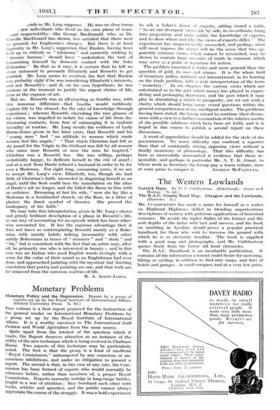Monetary Problems Monetary Policy and the Depression. Report by a
group of experts set up by the Royal Institute of International Affairs. (Oxford University Press. 7s. 6d.) Tins volume is a first report prepared for the instruction of the general. reader on International Monetary Problems by a group set up by the Royal Institute of International Affairs. It is a worthy successor to The International Gold Problem and World Agriculture from the same source.
Quite apart from the interest of the question which it treats, the Report deserves attention as an instance of the utility of the new technique which is being evolved in Chatham House. Two aspects of this technique may be particularly noted. The first is that the group is a kind of unofficial ". Royal Commission," unhampered by any conscious or un- conscious inhibitions, and under no obligation to present a report. The second is that, in this case at any rate, thi Com- mission has been formed of experts who would normally be witnesses before, rather than members of, a proper Royal Commission. Experts normally indulge in long-range battles, fought in a war of attrition ; they bombard each other with books, articles and speeches, and the public cannot always appreciate the course of the struggle. It was a bold experiment
to ask a baker's dozen of experts,• sitting round a table, " to set out divergent views side by side, to co-ordinate, bring into proportion, and make public the knowledge of experts, and to show where and why the views of experts differ." The experiment has unquestionably succeeded, and perhaps what will most impress the reader will be the sense that two ap- parently extreme views, which cannot be reconciled, may be shown to contain large amounts of truth in common which. may serve as a point of departure for action. '
The problem examined is wider and more general than the question of gold, its uses and abuses. It is the whole field of monetary policy, national and international, in its bearing. on the trade problem, with a wide interpretation of the term " monetary." In six chapters the various views which are entertained as to the part which money has played in engen-• dering and prolonging depression, and the part which it may play in stimulating a return to prosperity, are set out with a clarity which should bring many vexed questions within the general comprehension of any intelligent reader. The problems having been stated, the Group intend to continue their discus- sions with a view to a further examination of the relative merits of the possible solutions which have been set forth, and it is hoped in due course to publish a second report on these
discussions. - A word of appreciation should be added for the style of the presentation. No worse difficulty can confront a reporter than that of continually stating opposing views without a deadly monotony of phraseology. That this .difficalty has been so successfully surmounted is evidence that those re- sponsible, and perhaps in particular Mr. A. T. K. Grant, to whose work as Secretary the Group pay a warm tribute, were
















































 Previous page
Previous page